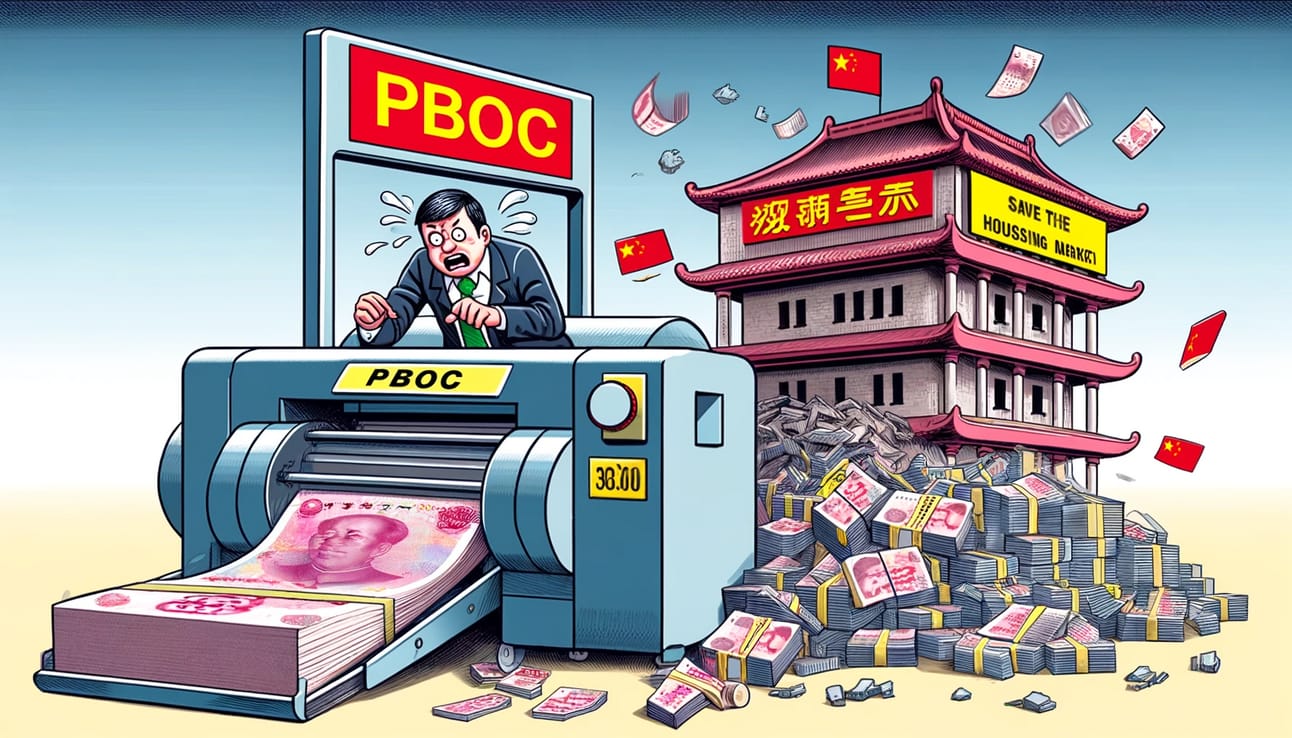TheBRRR’s Thoughts
GM.
It’s been a constructive week for markets with the major US indexes up over 3% each.
Crypto also performed well - as bitcoin led the charge higher gaining over 9% since last Friday. Amongst major crypto assets, only Solana has meaningfully outperformed - it’s up 16% over the same timeframe.
As price has climbed this week, Congress voted to repeal a bad crypto regulation and are sending the bill to Biden’s desk.
A dozen democrats in the senate voted with the republicans to repeal the regulation - a tacit acknowledgement that Trump’s embrace of crypto could help him win the election.
Overall, the bullish narrative for risk assets remains clean - liquidity is on the rise:
-The Fed has ruled out interest rate hikes, and markets expect at least 1 cut before the election
-The European Central Bank is ready to start cutting rates
-China has begun injecting liquidity into his troubled residential real estate market

Millennium Management Reveals $2B BTC ETF Position
Institutional Investment: Major hedge funds and financial institutions like Millennium Management, Point72, and Citadel Advisors have invested significantly in Bitcoin ETFs. Millennium holds around $2 billion in shares across at least four Bitcoin ETFs.
Diverse Investors: Other notable investors include the State of Wisconsin Investment Board and Bank of Montreal, spanning global locations from Hong Kong to Switzerland.
13F Filings: Approximately 1,000 entities reported holdings in Bitcoin ETFs as of the first-quarter 13F filings.
Senate Dems Join Republicans Against Warren & Biden On Crypto Bill
WHAT HAPPENED
Senate Repeal: The U.S. Senate voted 60-38 to repeal the SEC’s Staff Accounting Bulletin No. 121 (SAB 121).
Why The Bulletin Is for Crypto: SAB 121 imposes significant capital requirements on banks working with crypto clients, which can discourage banks from offering crypto custody services and stifle innovation in the sector. The repeal unwinds this change.
Bipartisan Support: A dozen Democrats joined 48 Republicans to pass the resolution.
Presidential Veto: President Joe Biden has vowed to veto the resolution, emphasizing its importance for protecting investors and maintaining financial stability.
WHY IT MATTERS
Impact on Financial Innovation: The repeal of SAB 121 is seen as a win for financial innovation, particularly within the crypto sector. Sen. Cynthia Lummis (R-Wyo.) described the bulletin as a “disaster” for failing to protect consumers and hindering crypto growth.
Regulatory Overreach: Critics argue that the SEC overstepped by issuing SAB 121 without proper rulemaking procedures, a stance supported by the Government Accountability Office. This resolution marks a significant pushback against regulatory overreach
Future Constraints: If the repeal is successful, it would prevent the SEC from issuing similar regulations in the future, potentially limiting its ability to enforce crypto-related safeguards.
Key Data Points
Vote Breakdown: 60 votes in favor (including 12 Democrats) and 38 against.
Regulatory Context: SAB 121 required companies to record customers’ cryptocurrencies on their balance sheets, which could have major capital implications for banks.
Legislative History: This marks the first standalone crypto legislation passed by both chambers of Congress, highlighting the increasing legislative focus on the crypto industry.
Proponents:
Sen. Cynthia Lummis called the vote a rebuke of the Biden administration and SEC Chair Gary Gensler’s handling of crypto assets.
Rep. Mike Flood noted the bipartisan support and urged President Biden to reconsider his veto threat.
Rep. Wiley Nickel emphasized the need for proper rulemaking processes and criticized the SEC for overstepping its authority.
Implications
Market Impact: The repeal could reduce compliance burdens on banks, encouraging more financial institutions to engage with crypto assets.
Legislative Significance: This move signifies growing bipartisan interest and involvement in crypto regulation, potentially paving the way for more comprehensive crypto legislation in the future.
Bank of China Earmarks $42B For State Buying Of Unsold Homes

WHAT HAPPENED
Massive Funding Initiative: The People’s Bank of China (PBOC) will provide 300 billion yuan ($41.5 billion) to help state-owned companies buy unsold homes.
Relending Program: The program will offer cheap funding to 21 providers, including policy banks, state-owned commercial lenders, and joint-stock banks, at a 1.75% interest rate with one-year terms that can roll over four times.
Mortgage Rate Adjustments: China has removed its nationwide mortgage rate floor for first and second home purchases to boost the housing market.
WHY IT MATTERS
Economic Support: This initiative is part of broader measures to address China’s ongoing property crisis, which has significantly impacted economic growth.
Market Reaction: Property stocks surged in anticipation of the measures, though the 300 billion yuan fell short of the 1 trillion yuan some analysts expected, potentially disappointing investors.
Housing Market Impact: By converting unsold homes into affordable housing, the PBOC aims to stabilize home prices and increase consumer confidence.
Key Details
Funding Mechanism: The PBOC will provide 60% of the loan's principal to banks extending loans to local state-owned enterprises (SOEs) for the purchase of unsold homes.
Use of Homes: Purchased homes should be sold or leased as public housing, excluding entities with hidden debt from participating.
Policy Context: This move follows the easing of mortgage rules and a call from the Politburo to address unsold home stock.
Market Context
Real Estate Crisis: The crisis, driven by developers’ failure to deliver presold homes, is a major drag on China’s economic growth. April saw the steepest month-on-month drop in home prices in a decade.
Anticipated Impact: While the funding size is less than expected, the initiative demonstrates the government’s commitment to supporting the housing market and mitigating broader economic risks.
Learn How AI Impacts Strategy with MIT
As AI technology continues to advance, businesses are facing new challenges and opportunities across the board. Stay ahead of the curve by understanding how AI can impact your business strategy.
In the MIT Artificial Intelligence: Implications for Business Strategy online short course you’ll gain:
Practical knowledge and a foundational understanding of AI's current state
The ability to identify and leverage AI opportunities for organizational growth
A focus on the managerial rather than technical aspects of AI to prepare you for strategic decision making
Premium Subscriber Section

You’ll need to upgrade your subscription to view our portfolio and get our real-time trade alerts. You can upgrade for $3/month or $14.99/year.
Trades, Watchlist & Live Portfolio
(paywall only)
Most Recently Revealed Trade:
Wednesday April 17 2024: We bought more Solana and added Solana’s top memecoin WIF on the heels of a leverage wipeout dip after the WW3 scare.

Here’s the link to The BRRR Technical Analysis Chatbot - let me know what you think!
Portfolio

Older Notes
Wednesday, April 3, 2024: We haven’t deployed the cash yet, but are eyeing exposure to a few assets including META and PLTR.
Monday, March 11, 2024: We sold Apple this morning. The newsletter held the stock from inception a year ago for a meager 12% gain.
The company has lost its magic evident by complacent iPhone releases, lack of a coherent vision for AI integration and punitive & anti-competitive App Store policies.
We believe the stock will move in-line with the broader Nasdaq going forward.
We’ll sit on the cash for now, but plan to redeploy it quickly.
Watchlist
$META: Sleeper in AI race and ad biz is proving resilient
How was today's email?
Got feedback? Follow the writer on Twitter @frank_locascio and send a message.
The BRRR is meant for informational purposes only. It is not investment advice. Please consult with your investment, tax, or legal advisor before making any investment decisions.ll



